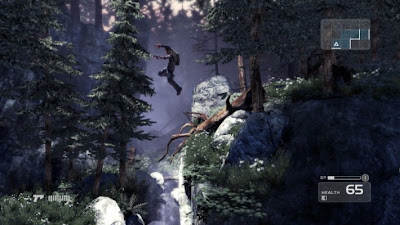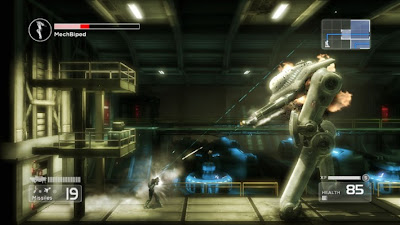In 2001, when asked to explain what sort of game his upcoming Devil May Cry was, Hideki Kamiya described it as "stylish hard action", which is an awesome description, and one I still like to use to describe third person action games with a focus on spectacular combat.
Three such games, all due for release in the first two months of 2010, have caught my attention, and they are:

Bayonetta is the latest game from Hideki Kamiya, through his new studio Platinum Games, which was created from the ashes of Capcom's innovative side studio, Clover, and is a spiritual follow up to Devil May Cry. The game is already out in Japan, and import reviews have so far been positively
glowing. However, whereas the original Devil May Cry succeeded because of it's over the top Japanese-ness (nonsensical story, over stylised hero, constant battle against odd, demonic enemies), the games industry has changed since 2001 and I almost feel that this is now one of the things that holds Bayonetta back for me. I'm not sure I want to play as some blatantly over-sexualised librarian fantasy as she dismembers cherubs to the sounds of a bizarre mix of j-pop and lounge jazz.
A demo for Bayonetta is up on Xbox Live already, I am downloading it as I type this post, but it still may be a while before I can give it a proper try. The game is due out in Europe on 8 January.

It's actually hard to tell whether Dante's Inferno is the product of the new, positive EA, or the old, cynical EA. On the plus side, it's fresh IP (at least in gaming terms), developed by well-regarded studio Visceral Games (of Dead Space fame), and previews of it have commended the graphic style and combat mechanics, which are probably the two most important aspects of a Stylish Hard Action game. On the minus side, it's absolutely transparent in its desire to ape God of War (some canny EA exec no doubt realised there would be a gap in the Xbox 360 market created by God of War 3's PS3 exclusivity, which their multiplatform title could exploit), only with medieval Christian mythology rather than Greek, and it takes so many liberties with a well-known piece of literature that it comes across as wanting nothing more than to steal the title for some free name recognition. In addition, EA's marketers actually arranged a fake Christian group to stage a protest against the game outside E3 in order to drum up some publicity, which is pretty crass.
The demo for Dante's Inferno is due for release on Christmas eve, with the game itself, the last of these three to be released, coming out on 5 February, still a month in advance of elephant in the room, God of War 3.

With art direction from comic book artist Joe Madureira, Darksiders is the tale one of the Riders of the Apocalypse's quest for revenge against the celestial or infernal forces that have betrayed him. It's not going to win plaudits from the people who complain that the video game industry is still geared too much towards adolescent and post-adolescent males (neither is Bayonetta, though), but as I have explained before, there is a place for developed, complex characters, and there is a place for
action heroes, and War looks like a pretty good action hero.
Every preview for the game I have read is keen to point out the similarities to Zelda rather than God of War, but having never played a Zelda game before, I have no idea what this is supposed to mean or why it should make me weak at the knees. Perhaps it has something to do with a more exploratory game experience rather than the more linear style of a regular third person action game. All I know is that Darksiders has characters with impossibly broad shoulders, huge enemies, guns, giant swords, and the ability to hit people with lamp-posts or throw cars at them. Which seems pretty cool to me.
As far as I know, there is no demo planned for Darksiders, and the only footage I've got of it, a trailer I downloaded from E3 this year, looked pretty shonky whenever it used in-engine footage. Coming from a studio with no real pedigree, Darksiders is the one of these three that I most want to like, but I fear it may be the worst as a game. Darksiders is out on the 8th of January 2010, the same day as Bayonetta's western release.









